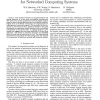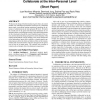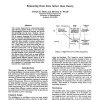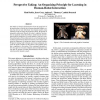65 search results - page 6 / 13 » Deriving epistemic conclusions from agent architecture |
HICSS
2002
IEEE
14 years 2 months ago
2002
IEEE
This research focuses on the performance and timing behavior of a two level survivability architecture. The lower level of the architecture involves attack analysis based on kernel...
BMCBI
2006
13 years 9 months ago
2006
Background: Cellular metabolism can be characterized by networks of enzymatic reactions and transport processes capable of supporting cellular life. Our aim is to find evolutionar...
ATAL
2008
Springer
13 years 11 months ago
2008
Springer
We discuss the design of the Intermediary Agent's brain, the control module of an embodied conversational virtual peer in a simulation game aimed at providing learning experi...
FLAIRS
2000
13 years 11 months ago
2000
Thecurrent frameworkfor constructing intelligent tutoring systems(ITS) is to use psychological/pedagogical theories of learning, and encode this knowledgeinto the tutor. However,t...
AAAI
2006
13 years 11 months ago
2006
The ability to interpret demonstrations from the perspective of the teacher plays a critical role in human learning. Robotic systems that aim to learn effectively from human teach...




